
Qatar Amir
With the participation of HH the Amir Sheikh Tamim bin Hamad Al-Thani, the activities of the 26th UN Climate Change Conference of the Parties (COP26) in Glasgow, Scotland, continue on Monday until Nov. 12 to discuss the repercussions and dangers of climate change on the planet.
About 25,000 people are expected to participate in the conference, including 127 state leaders, heads of government, directors and officials of many organizations concerned with climate affairs around the world.
COP26 is described as the "the last-chance saloon", with evidence of repercussions is clear, and the forest fires and floods that the world has witnessed in recent months are only a small part of them.
The Conference, which was postponed a year due to the COVID-19 pandemic, aims to prevent global temperatures from rising more than 1.5 degrees Celsius this century, a limit that scientists say will spare the Earth the most devastating consequences of global warming.
It will be the first conference that will review the extent of the world's progress or failure in achieving the required goals since the signing of the 2015 Paris Agreement, an international treaty signed by nearly 200 countries with the aim of sparing humanity a climate catastrophe, and preventing many changes that occurred on the planet from becoming permanent and irreversible.
COP26 aims not to broker a new international treaty on climate change, but to ensure that the 1.5-degree Celsius target set by the 2015 Paris Agreement remains within reach. It will also discuss the promises of rich countries responsible for the bulk of emissions that cause global warming to provide USD 100 billion by 2020 to developing countries, which are among the countries most affected by climate change, as the rich countries failed to collect more than USD 80 billion annually, while environmental groups and leaders of developing countries say USD 100 billion is not enough.
Leaders from 120 countries will attend the conference, while Russian President Vladimir Putin, China's Xi Jinping and Brazil's Jair Bolsonaro will not attend. The three countries are among the most important countries whose cooperation and commitment the world needs to work to preserve the environment.
US President Joe Biden came to Glasgow without a strong legislation to put his climate pledge into action, meanwhile Congress is wrangling over how to fund it, and with uncertainty over whether US agencies can set rules for greenhouse gas emissions.
International experts say climate change is a critical test of the ability of countries to do two opposing things simultaneously, which are to compete for global dominance and cooperate with each other to save the world. Experts used the US and China as an example and warned that unless the two countries can cooperate together on the climate, they will not be able to work together on any other issue, especially since the two countries are responsible for more than 40 percent of carbon dioxide emissions.
The top priority at the Glasgow conference is to reach 'net-zero' carbon by the middle of the century, with bolder and faster cuts to carbon emissions by 2030.
"Nature-based solutions" (NbS) will be discussed at the conference, which means the use of nature for tackling socio-environmental challenges, such as carbon sequestration, or planting plants and trees to protect against extreme weather events such as floods or sandstorms.
A number of initiatives aimed at addressing environmental challenges such as eliminating the use of coal, stopping deforestation, switching to electric cars, investing in renewable energy, and how to help poor countries play their role are also expected to be established, in the hope of reaching the ultimate goal of achieving a 'net-zero' situation - where no more greenhouse gases go into the atmosphere than are removed, by 2050.
Discussions are set to focus on whether rich countries make climate pledges ambitious enough to change the world's current course, which is heading toward 3 degrees of warming by 2100.
Meanwhile, China, in particular, is under pressure to place new limits on its domestic coal consumption. It has pledged to stop funding the construction of coal-fired power plants abroad, but continues to agree to build new plants at home that will ensure that a lot of coal is burned for decades to come. The recent power outages and coal shortages within China have also led to the belief that its leaders will not give up coal soon.
On the other hand, leading global coal and gas supplier Australia has pledged to achieve net zero carbon emissions by 2050. Prime Minister Scott Morrison however said the plan would not include ending Australia's fossil fuel sectors by 2030. He also faces criticism for putting forward a plan that environmentalists consider weak and overly dependent on new technology and consumer behavior, rather than legislation.
Although the Climate Conference is held annually, experts and scientists say the decisions made in Glasgow over the next two weeks will be the most important since the Paris Agreement, while many believe that bringing leaders together in the same room is essential. However, hopes for significant progress appear weak, and the success of the conference will depend primarily on the willingness of world leaders to move beyond the progress they have already made and pledge further emissions reductions for the benefit of the planet.
Observers stress that if the next two weeks of discussions in Glasgow result in a series of detailed climate pledges from countries responsible for the majority of carbon emissions, the conference could have a significant impact and clear success, especially if those countries kept their promises, while climate scientists assert that humanity has nearly a decade to significantly reduce greenhouse gas emissions before crossing thresholds that would make recovery from climate collapse impossible.
SOURCE: QNA
.jpg)
Qatar Secures Place Among the World's Top 10 Wealthiest Nations
.jpg)
Hamad International Airport Witnesses Record Increase in Passenger Traffic

Saudi Arabia: Any visa holder can now perform Umrah

What are Qatar's Labour Laws on Annual Leave?
Leave a comment